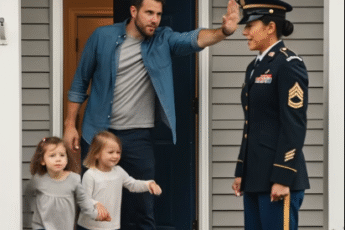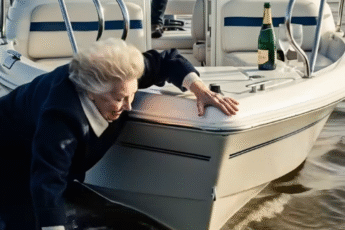My name is Daniel, and I am fifty-four years old. If you had told me a decade ago that the little girl who once begged me to braid her hair would one day pretend I didn’t exist at her wedding, I would have laughed. But that’s the funny thing about family. The people you give the most to often believe they are entitled to even more. And sometimes, they only recognize your value when the credit card declines.
I met Grace when she was just nine, a shy girl with her mother’s eyes. Her mom, Olivia, and I were both navigating the messy aftermath of divorce. Grace’s biological father, Jeremy, was a ghost in her life, materializing twice a year with a check and a trip for ice cream before vanishing again. I never tried to replace him. I just showed up. For the school plays, the scraped knees, the late-night math homework, and the first teenage heartbreak. I was there, especially when it was inconvenient.
Over time, she started calling me “Dad.” It wasn’t something I asked for. In fact, the day she first said it, after her middle school graduation—”Thanks, Dad”—I’ll admit, I had to turn away to wipe my eyes. Olivia squeezed my hand, and in that moment, we were a family.
I paid for her braces. I bought her first car—a safe, used Honda I’d saved for. When she got into her dream college, I drove the U-Haul, assembled her IKEA furniture, and left her with a fridge full of groceries and a lump in my throat. I was there not because I had to be, but because I loved her.
But something shifted when she turned twenty. The thank-yous became scarce, the phone calls more transactional. Then, during her senior year, Jeremy reappeared. He’d apparently turned over a new leaf, now a successful entrepreneur with a flashy car and a checkbook to match. He started posting old photos of them on social media, conveniently cropping me out of the frame. Grace lapped it up like she was starving for his approval. I didn’t blame her. Every child wants to be wanted by their parent. Still, I couldn’t shake the feeling that I had been the substitute teacher all along, and the real lesson was about to begin.
Then came the engagement. We were all on the couch when she waved the diamond in front of us. Olivia clapped, and I pulled Grace into a hug. “We’re so proud of you,” I said.
She smiled, but it didn’t quite reach her eyes. “Thanks. I’m just so glad I’ll have both my parents there to walk me down the aisle.”
I blinked. Olivia glanced at me, a flicker of panic in her eyes. “You mean…” she began.
“Of course, I mean Dad,” Grace said, her gaze fixed on the diamond. She meant Jeremy. Not me.
I brushed it off. I told myself it was just a phase, a sentimental gesture. But the slights kept piling up. She started referring to Jeremy exclusively as “Dad” and to me as “Daniel” in front of others. When I gently offered to help with wedding costs, she smiled, nodded, and then asked if I could front the $12,000 for the venue deposit. There was no mention of reimbursement, no “thank you.” Just the calm, unwavering assumption that I would handle it.
And I did. I told myself I was doing it for Olivia, for the family. But as the months wore on, I felt less like a father figure and more like an ATM with legs. Olivia noticed, too. She tried to talk to Grace, but her gentle inquiries were met with accusations. “You’re just trying to make me feel guilty for wanting my real dad in my life!” Grace would snap. That word, real, stung more than I ever let on.
The week before the wedding, I overheard a conversation not meant for my ears. I’d come home early and paused in the hallway, hearing their voices from the kitchen.
“He’s paid for almost everything, Grace,” Olivia said, her voice low but firm. “You can’t just pretend he doesn’t exist. He has been more of a father to you than Jeremy ever was.”
Grace scoffed. “That was his choice. No one forced him to.”
“You used to call him Dad,” Olivia pressed.
“That was before I had a real one again,” she snapped.
I didn’t wait to hear more. I backed out of the house, got in my car, and just drove, the engine’s hum a poor substitute for the screaming in my own head.
The day of the wedding, I put on my best suit. I showed up early, helped set up chairs, and coordinated with the caterers. Grace, in her magnificent white gown, sailed past me with barely a nod. Jeremy arrived late, smelling of expensive cologne, and she squealed, hugging him like a soldier returning from war. I stood in the background, a ghost at a feast I had funded.
During the ceremony, I sat beside Olivia, her hand a cold, tense weight in mine. When the officiant asked who gave this woman to be married, Grace looped her arm through Jeremy’s and beamed. Not a glance in my direction. The reception was a masterclass in erasure. The father-daughter dance was with Jeremy. In her speech, she thanked her mother, her new in-laws, and “my incredible dad, Jeremy, who came back into my life at just the right moment.” My name was never spoken.
I didn’t make a scene. I smiled, I clapped, I toasted the happy couple. But inside, a quiet, slow burn was turning years of love and patience to ash.
After the cake was cut, as the crowd was thinning, Grace approached me. She looked radiant, flushed with the smug exhaustion of someone who has been celebrated all day. She handed me a folded piece of paper.
“The final balance,” she said cheerfully, as if we were settling up after lunch. “Thought you’d want to take care of this before we fly out tomorrow.”
I unfolded the paper. The number on it made my jaw tighten. I looked at her, at her expectant smile, and for the first time in a decade, I didn’t reach for my wallet. I didn’t nod. I didn’t say a word. I just turned, walked right past her, and out into the night.
I didn’t sleep. I lay in bed, watching the headlights of passing cars paint shifting patterns on the ceiling. It wasn’t anger I felt, or even hurt. It was a profound and chilling emptiness, as if a door deep inside me had quietly clicked shut.
The next morning, my phone buzzed incessantly. I ignored the calls and texts from Olivia, Grace, and even Jeremy. Instead, I made coffee and sat down in my home office with a thick binder labeled “Wedding Expenses.” Every receipt, every invoice, every wire transfer was neatly categorized. The total came to just under $38,000. I had paid for over eighty percent of the entire event.
And the final balance she had handed me? It was a hastily scribbled list, including line items I had already paid. She had tried to double-bill me, confident that I would be too sentimental or too spineless to notice.
I spent that Sunday methodically dismantling the financial scaffolding that had supported her fantasy. I filed disputes with every vendor I had paid directly, providing proof of payment. I froze the joint account I had set up with Olivia for wedding emergencies. And I sent Grace a single, simple text:
I will no longer be responsible for any of your wedding costs. Any outstanding balance is between you and your biological father. Please direct all future communication through your mother.
That night, Olivia and I finally talked. She was heartbroken, not just by Grace’s actions, but by my silence. “I thought she’d come around,” she cried. “I thought once she saw everything you did for her…”
“She did see it, Olivia,” I said quietly. “She just didn’t care.”
The fallout was swift. Grace sent a long, self-pitying email, justifying her actions and calling me childish for “abandoning my responsibilities.” Jeremy left a voicemail. “Man to man,” he’d said, “I think you overreacted. She needed me, and I stepped up. Don’t punish her for choosing her real family.”
Stepped up. I had stepped up when Grace had appendicitis and Jeremy was “too busy.” I had stepped up when her financial aid fell through. I had stepped up every single day for ten years.
That’s when I decided I wasn’t just walking away. I was building a fortress. I updated my will, removing Grace as a beneficiary. I made a sizable donation to a scholarship fund for foster youth. And I wrote a final letter to Olivia, explaining that while I still cared for her, I could no longer pour myself into a family that saw my worth only in dollar signs. I left the letter on the kitchen counter and moved into a condo across town—a backup plan I’d quietly arranged months ago, a premonition I hadn’t wanted to acknowledge.
A month later, I got a message from Olivia. She’s here. She wants to talk. Please. She’s crying.
I sat at my desk, the message glowing on my screen, and I thought of every small moment of fatherhood I had cherished. Then I packed my briefcase and drove to the house.
Grace was sitting on the living room couch, her eyes red and swollen. She stood when she saw me. “Daniel…” she began.
I held up a hand, silencing her. I walked past her, set my briefcase on the table, and then turned to face her, my gaze steady and final.
“When you were thirteen,” I said, my voice even, “you begged me to come to your school’s father-daughter breakfast because you didn’t want to sit alone. Jeremy hadn’t texted in six months. I took the morning off work, wore that awful blue tie you liked, and you held my arm and told everyone I was your dad.”
She flinched. “You remember that?” she whispered.
“I remember everything, Grace. Because I was there for everything. I wasn’t keeping score then. But apparently, you were.”
“I messed up,” she said, her voice cracking. “I got caught up in the idea of finally having my real dad around.”
“You thought I’d just take it,” I interrupted, my voice softer now. “Like always.”
Olivia stepped out of the hallway, her own eyes red from crying. Grace turned to her as if for a lifeline. “Mom, tell him…”
But Olivia just shook her head. “No, Grace. Not this time.”
Grace looked between us, the ground shifting beneath her. “I came to apologize,” she said. “To fix this.”
“No,” I said. “You came to stop the fallout. That’s not the same thing.” I paused, letting the weight of the words settle in the room. “Forgiveness can’t be demanded, Grace. It has to be earned. And that’s not something I can hand out like another check.”
Her shoulders slumped in defeat. I gathered my things and headed for the door.
“What do I have to do?” she called out behind me, her voice trembling.
I paused, my hand on the doorknob. “You start,” I said, not looking back, “by not asking me to tell you.”
Then I walked out.
For three days, there was silence. Then, on the fourth day, my assistant buzzed me at my office. “There’s a young woman here,” she said, her voice hesitant. “Says her name’s Grace. She doesn’t have an appointment.”
“Send her in.”
She walked in, not with the arrogance she used to wear like a second skin, but with a quiet, nervous energy. She sat across from my desk and opened a thin folder. Inside was a neatly typed document: Wedding Expense Reconciliation Report.
“I went through everything,” she said, her voice low. “I called every vendor. I made a list of what you paid and what I owe you. I’ve added interest and broken it down into a repayment plan. If you agree to the terms, I’ll sign it.”
She wasn’t crying. She wasn’t begging. She was taking accountability.
“I got your message,” she continued, “and at first, I hated it. But then I started remembering things. The time you drove six hours back from a business trip to help me with my college essay. The birthday Jeremy missed when I was sixteen, and you found that out-of-print book series I loved. I hugged you so tight that day because, in that moment, I didn’t miss him at all.” Her voice shook, but she steadied it. “I realize now, I didn’t just erase you from my wedding. I erased you from my story. But you were never a placeholder. You were the only one who stayed.”
I didn’t speak. My throat had tightened, and I wasn’t sure I trusted my own voice.
“I’m not asking you to forgive me today,” she said, finally meeting my eyes. “But I want you to know that I see it now. All of it. And I am going to make it right.”
It was never about the money. And she knew that. Which is why this mattered. After a long moment, I gave a single, slow nod. “Alright,” I said. “Let’s see how serious you are.”
That was six months ago. She has made every payment, on time. More than that, she calls once a week. We’ve had dinner, just the three of us—her, her husband, and me. Olivia and I are seeing each other again, slowly, carefully learning to trust with our eyes wide open.
Last week, Grace asked me if I would consider being a part of her child’s life. She’s pregnant. Her voice trembled when she asked, as if she expected me to say no. I told her I had a lot of good bedtime stories saved up. She cried. Happy tears, this time.
We are not perfect. There are still scars. But for the first time in a very long time, I don’t feel invisible. I feel seen. Not for what I gave, but for who I am. And that, I’ve learned, is the most powerful kind of validation there is.





